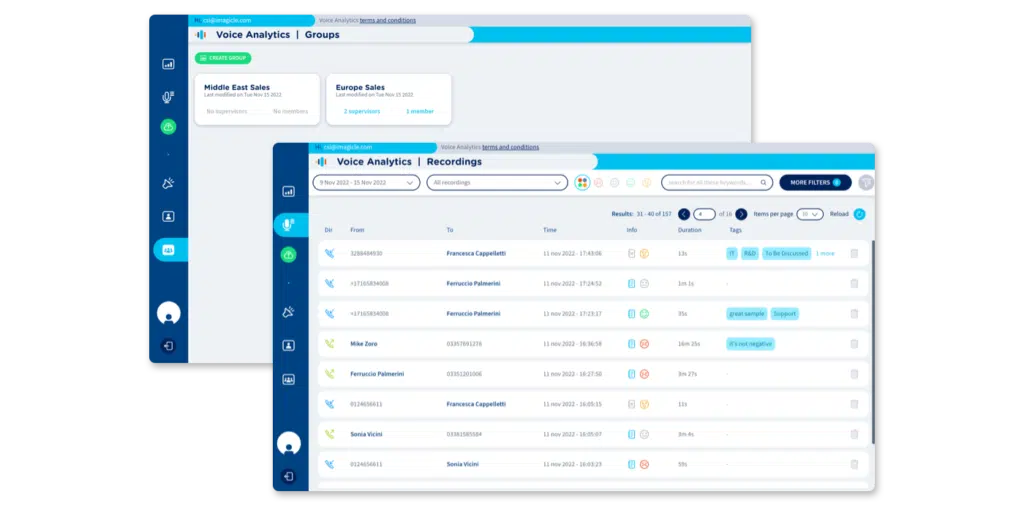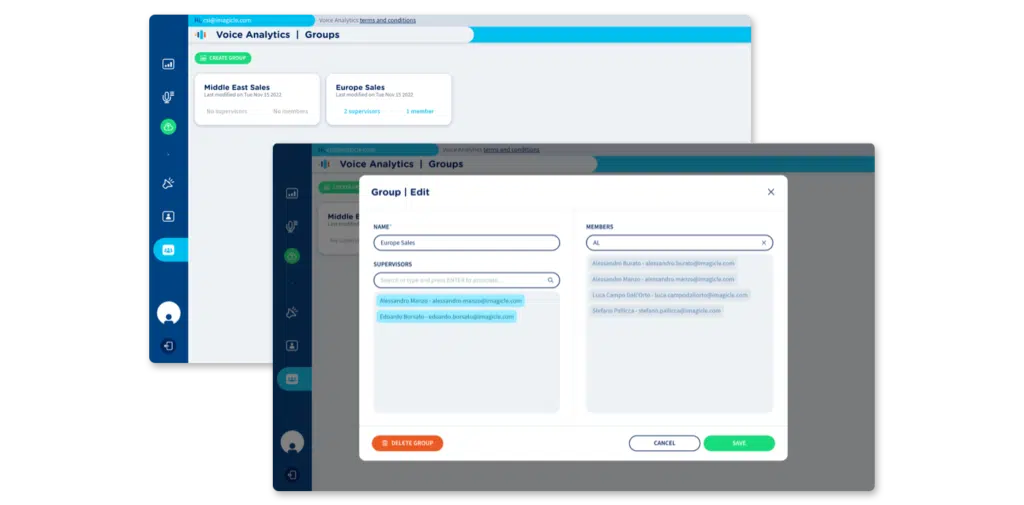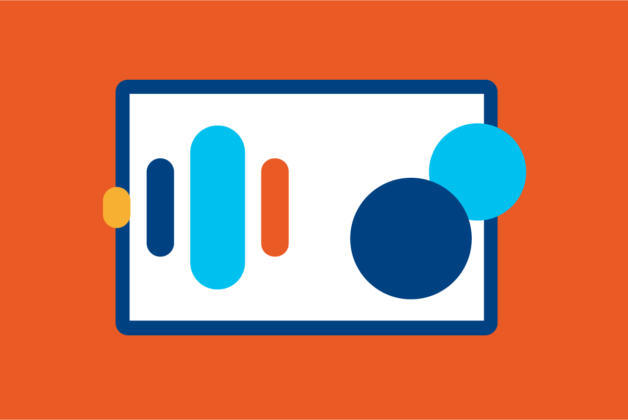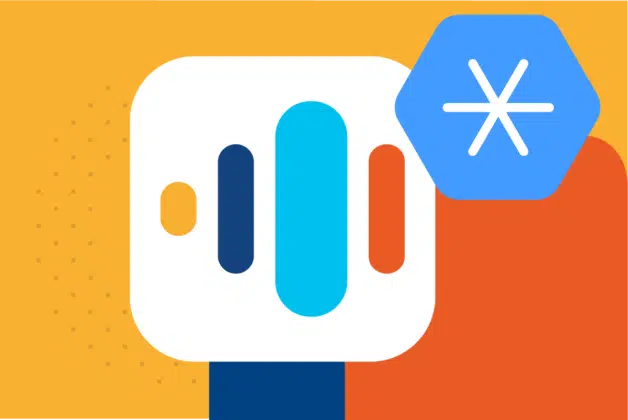Voice Analytics: tags and groups for better performance auditing.
As the hot summer breeze leaves the stage to sweaters and hot beverages, it’s time to reveal our audience the first news of Imagicle Winter Release 2023. Imagicle Voice Analytics, our AI-based Call Recording add-on, is now enriched with two new features to make supervisors’ lives even easier: tags and groups. Ready to discover them?

Supervisors have always been Voice Analytics’ main focus. The very existence of the product is aimed at simplifying the life of those who monitor the quality of calls made by supervised operators.
Today, the performance of this app takes a step further towards perfecting the collaboration of agents and supervisors: not only has Winter Release 2023 made Voice Analytics 3x faster thanks to software improvements, it also brought along two new tools that improve the organization of transcriptions.
- Tags, to identify key conversations faster, smarter, and easier.
- Groups, to allow a smarter and compartmentalized management of transcriptions.
Before diving into their discovery, let’s summarize what Voice Analytics is and what it does.

Voice Analytics: making supervisors’ life easier.
For those of you who don’t know it yet, Imagicle Voice Analytics is a cloud-native application that leverages the benefits of cloud services to transcribe voice conversations and analyze their content. This process will produce insight into what has been said and generate aggregated statistics on operators’ performances.
It is fully integrated with Imagicle UCX Cloud Suite, which means it is available as an Imagicle app along with the pre-existing products: in particular, its seamless integration with Call Recording allows for recorded conversations to be transferred automatically to Voice Analytics to be processed and analyzed.
After a new dashboard was added earlier this year, aimed at further improving the analysis of call data in an aggregated way, for Winter Release 2023 we decided to concentrate our efforts on improving the usability and organization of Voice Analytics.
Without further ado, let’s see the two new features in detail.
Tags: for a smarter conversation organization.
Manual tagging of conversations gives both agents and supevisors the possibility of creating and assigning tags to conversations to improve search, organization, and classification.
In short, tags are labels that provide additional information to content, in form of a particular set of keywords. Tagging is primarily used to make information easier to find or link to.

Supervisors often struggle to navigate in the mole of conversations produced by their operators: thinking on this use case, it has been natural to introduce such functionality in Voice Analytics. It is very useful to identify and organize recordings: be it for topic coherence, script adherence or just to remember a particular feedback to give an operator.
To give you an example, imagine a supervisor wants to see the transcripts for conversations where orders were approved to spot successful approaches. Thanks to tags, they can find such conversations right away: operators will tag them as “order approved” and all supervisors have to do is filter the conversations for that tag.

In Voice Analytics you can do so for each conversation: the recording details section now presents a box that offers the possibility to create any number of tags and assign them to that specific conversation.
Assigned tags are also visible in the conversation list for a glance. Moreover, as briefly mentioned above, a new filter option is also available: now you can search for conversations tagged with specific items.
Groups. Structure your company’s visibility policies.
In real-life scenarios, a company is divided into several teams and departments, so it also makes sense to mirror them inside Voice Analytics.
An administrator can now arrange users in groups as members, and assign to each group one or more supervisors: this way the supervisors of each group have visibility on its members’ conversations and have a series of tools available to evaluate their performance and sentiment.
A Voice Analytics user can be a supervisor of one or more groups.
Once a user has been made a supervisor, they can enter and evaluate the detail of each conversation belonging to the members of their groups.

In summary, each conversation consists of several elements:
- the original recording of the conversation
- the transcription of the conversation
- the sentiment analysis of the transcribed text
- tags associated with that conversation
A supervisor can access all these elements associated with a conversation belonging to a group member. In addition to having visibility of conversation tags, a supervisor can also create and assign manually new tags to that specific conversation.
Try the new features.
Apply for a free trial to experience their benefits first-hand.
A supervisor has also the possibility to set alarms on their group members’ conversation, configurable with specific conditions: when certain keywords are pronounced or not during the conversation, if it turns out to have a certain sentiment, or both.
When a member of their group produces a conversation that corresponds to a preset alarm, the supervisor will receive an e-mail notification with all the details. This way, the supervisor can address potential problems (or, why not, give well-deserved praise) as soon as the conversation is processed.

Having this kind of organization makes analysis a lot easier – each supervisor can narrow their scope down to what matters to them, thus better prioritizing their goals and everyday tasks.
Moreover, remember the dashboard we mentioned earlier? Of course, a supervisor can see in the dashboard all statistics regarding the members of the team they supervise, already filtered and aggregated:
- Overall sentiment: a general score of the global conversation sentiment, also divided into positive, neutral, and negative calls.
- Sentiment breakdown: two bars that represent the caller and callee’s mood
- Calls volume: calls recorded for the group members in the given period
- Sentiment trend: a graph with overall sentiment and users’ and remote parties’ sentiment trends, that can be compared with the data from the previous period
- Users Ranking by Sentiment: a score of the sentiment ranking of the specific operators, also comparable with previous data

In a nutshell, supervisors, at a glance, can measure their operator’s performance and quickly adopt measures: a great simplification in their everyday work.
Conclusions.
Winter has introduced two super new tools to make supervisors’ day-to-day easier!
The tagging feature allows any user of the platform to assign labels to their conversations, to mark and organize them via their preferred criteria, thus improving organization and collaboration.
The groups‘ functionality allows administrators to create groups of users, and supervisors of those groups can see the conversations and statistics of their team members, thus making the supervision and management job easier and clearer.
But although great, Voice Analytics is not the only Imagicle product that has received some blessings from Winter: stay tuned to find out what’s next!
How about seeing these new features in action?
Book a free demo with our specialists to see how they work live.
Sie könnten auch interessiert sein an...
-
Brochure IT Blog
Prova pubblicazione
Prova pubblicazione -
Entdecken Sie
BlogDE Prova Immagine
DE Prova ImmagineDE Lorem ipsum dolor sit amet, consectetur adipiscing elit. Fusce mattis eros ut nisl sollicitudin convallis. Aenean pulvinar consectetur ligula efficitur tincidunt. Nunc scelerisque nunc at leo maximus condimentum. Nulla viverra lorem id imperdiet fringilla. Donec vel vulputate nibh, id euismod nulla. Nulla elit felis, facilisis sed accumsan nec, vehicula in nisl. Quisque posuere augue […] -
Products Blog
Why You Should Choose Imagicle Virtual Agents AI to Empower Your Bank.
Why You Should Choose Imagicle Virtual Agents AI to Empower Your Bank.Discover the level of omnichannel automation Conversational AI brings to your bank.
Prova pubblicazione
 Entdecken Sie
Entdecken Sie



 Giulia Menichini
Giulia Menichini